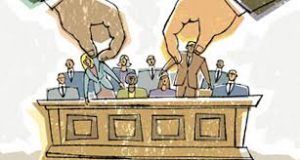 Any trial lawyer, whether civil or criminal, will tell you that a good voir dire is essential to winning your case. Voir dire literally means to speak the truth and refers to that aspect of a trial where the lawyer ask potential jurors questions in order to determine their capacity and suitability for jury service in the particular matter. The following is a brief description of voir dire in the United States District Court for the Southern District of New York (the same one involved in the Trump investigation):
Any trial lawyer, whether civil or criminal, will tell you that a good voir dire is essential to winning your case. Voir dire literally means to speak the truth and refers to that aspect of a trial where the lawyer ask potential jurors questions in order to determine their capacity and suitability for jury service in the particular matter. The following is a brief description of voir dire in the United States District Court for the Southern District of New York (the same one involved in the Trump investigation):
| To begin a jury trial, a panel of prospective jurors is called into the courtroom. This panel will include a number of persons from whom a jury will be selected to try the case. Alternate jurors may be chosen to take the place of jurors who become ill during the trial.
The panel members are sworn to answer questions about their qualifications to sit as jurors in the case. This questioning process is called the voir dire. This is an examination conducted by the judge and sometimes includes participation by counsel. A deliberately untruthful answer to any fair question could result in serious punishment to the person making it. The voir dire examination opens with a short statement about the case. The purpose is to inform the jurors of what the case is about and to identify the parties and their lawyers. Questions are then asked to find out whether any individuals on the panel have any personal interest in the case or know of any reason why they cannot render an impartial verdict. The court also wants to know whether any member of the panel is related to or personally acquainted with the parties, their lawyers, or the witnesses who will appear during trial. Other questions will determine whether any panel members have a prejudice or a feeling that might influence them in rendering a verdict. Any juror having knowledge of the case should explain this to the judge. Parties on either side may ask that a member of the panel be excused or exempted from service on a particular jury. These requests, or demands, are called challenges. A person may be challenged for cause if the examination shows he or she might be prejudiced. The judge will excuse an individual from the panel if the cause raised in the challenge is sufficient. There is no limit to the number of challenges for cause which either party may make. The parties also have a right to a certain number of challenges for which no cause is necessary. These are called peremptory challenges. Each side usually has a predetermined number of peremptory challenges. The peremptory challenge is a legal right long recognized by law as a means of giving both sides some choice in the make-up of a jury. Jurors should clearly understand that being eliminated from the jury panel by a peremptory challenge is no reflection upon their ability or integrity. In some courts the peremptory challenges are made openly in the hearing of the jury. In others, they are made from the jury list out of the jury’s sight. |
|
